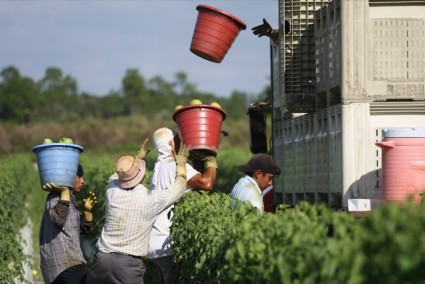 Hey Trader Joe’s: respect the people who harvest the food you sell. Photo: Scott RobertsonOver the past two decades, Trader Joe’s has grown rapidly as bargain-hunting foodies swarmed into its outlets. The chain now runs more than 350 stores with sales topping $8 billion in 2009.
Hey Trader Joe’s: respect the people who harvest the food you sell. Photo: Scott RobertsonOver the past two decades, Trader Joe’s has grown rapidly as bargain-hunting foodies swarmed into its outlets. The chain now runs more than 350 stores with sales topping $8 billion in 2009.
The secret to its dazzling success? Fortune magazine describes the retailer as “an offbeat, fun discovery zone that elevates food shopping from a chore to a cultural experience.”
Equally important, Trader Joe’s business model is based on offering a limited selection of high-quality products at very low prices. By restricting its inventory, it’s able to effectively wield its purchasing power and demand deep discounts from its suppliers.
Unfortunately for farmworkers, it is precisely this type of high-volume, low-cost purchasing that has created strong downward pressure on wages and working conditions as suppliers look to cut costs in order to maintain profit margins. Supermarket chains may not have created farmworker poverty, but they continue to play an active, and profitable, role in perpetuating it.
Since 2007, the Coalition of Immokalee Workers (CIW), an internationally recognized workers’ organization based in southwest Florida, and its allies have called on Trader Joe’s to support the emerging solution to the human rights crisis in Florida’s fields. Yet Trader Joe’s still refuses to join the Fair Food program, and its tomato supply chain — especially the provenance of its private-label produce — remains shrouded in secrecy. It is increasingly clear that Trader Joe’s, like other supermarket industry leaders, is attempting to shirk its responsibility to pay into the system, short workers of its portion of the pay increase, and refuse to tie its purchases to the Fair Food principles. Florida’s tomato industry is responsible for nearly all fresh tomatoes grown in the U.S. between November and June.
Until this untenable position changes, Trader Joe’s can expect growing discontent from farmworkers and consumers alike.
While Trader Joe’s execs ignore the situation in Florida’s tomato fields, the situation is changing rapidly in tomato country. Last November, the previously unthinkable happened — farmworkers and representatives of the $620 million Florida tomato industry announced an end to their decade-long labor conflict with a symbolic handshake and signed accord.
The landmark agreement between the CIW, and the Florida Tomato Growers Exchange (FTGE) will cover over 90 percent of the state’s tomato farms and improve pay and conditions for 30,000 farmworkers.
“This is a watershed moment in the history of Florida agriculture,” said Lucas Benitez of the CIW. “With this agreement, the Florida tomato industry — workers and growers alike — is coming together in partnership to turn the page on the conflict and stagnation of the past and instead forge a new and stronger industry.”
“This is the beginning, not the end, of a very long journey,” continued Benitez. “But with this agreement, the pieces are now in place for us to get to work on making the Florida tomato industry a model of social accountability for the 21st century.”
Hope is indeed on the horizon, thanks to the efforts of farmworkers, consumer activists, Florida tomato growers, and nine multinational fast-food and food service corporations who have joined in support of the CIW’s Fair Food principles.
 People are pissed at you, Joe.Photo: Phil RoederThese principles include a wage increase, a strict code of conduct, a cooperative complaint resolution system, a participatory health and safety program, and a worker-to-worker education process. This unfolding process marks a sea change in Florida, and even U.S., agriculture.
People are pissed at you, Joe.Photo: Phil RoederThese principles include a wage increase, a strict code of conduct, a cooperative complaint resolution system, a participatory health and safety program, and a worker-to-worker education process. This unfolding process marks a sea change in Florida, and even U.S., agriculture.
With the honorable exception of Whole Foods Market, however, the supermarket industry is refusing to do its part. While resistance is perhaps to be expected from grocery goliaths such as Kroger’s and Walmart, the indifference of Trader Joe’s — considered by some analysts to be one of the “world’s most ethical companies” — is quite baffling.
Yet that is exactly the position of the quirky cheap-chic retailer, and, along with the rest of the supermarket industry, the effect may be to significantly diminish farmworkers’ brightest hopes for change in several decades.
When consumers browse through the produce aisles at their local supermarkets, they are often unaware of the hidden exploitation behind the displays of fresh fruits and vegetables.
Sub-poverty wages, the denial of basic labor rights, sexual harassment, health and safety risks, and wage theft are commonplace for U.S. agricultural workers. The Department of Labor describes farmworkers as a “workforce in significant economic distress,” citing annual earnings of less then $12,500 to support its conclusions.
In extreme cases, workers have been held against their will and forced to work for little or no pay with threats or the actual use of violence. Since 1997, a total of nine farm labor slavery operations have been uncovered in Florida. The CIW has been involved in the discovery, investigation, and prosecution of seven of those operations, helping to liberate well over 1,000 workers.
The CIW’s Campaign for Fair Food seeks to improve wages and working conditions for Florida tomato pickers by calling on major buyers of tomatoes to pay a premium of one penny more per pound for their tomatoes, ensure that this penny is passed down directly to farmworkers, and work together with the CIW to implement a code of conduct in their supply chains.
Since the breakthrough with the FTGE, many changes are already evident on some of the state’s largest farms. For the first time ever, many farmworkers now have a reliable mechanism to ensure proper payment for hours worked, as well as a grievance procedure to address abuses or violations of the code of conduct.
Many workers are also receiving a wage increase from the penny per pound, combined with an end to the over-filling of buckets, a standard practice in the industry that can reduce a worker’s piece rate wages by as much as 10 percent.
“For this new model to achieve its full potential, however, retail food industry leaders must also step up and support the higher standards,” explains Gerardo Reyes, also of the CIW. “Key players in the fast-food and food service industries have already committed their support. It is time now for supermarket industry leaders to seize this historic opportunity and help make the promise of fresh — and fair — tomatoes from Florida a reality.”
Without Trader Joe’s — and the rest of the supermarket industry — paying into the penny-per-pound program and conditioning their purchases on the Fair Food principles, workers’ raises are shorted and the push to improve working conditions is undermined.




